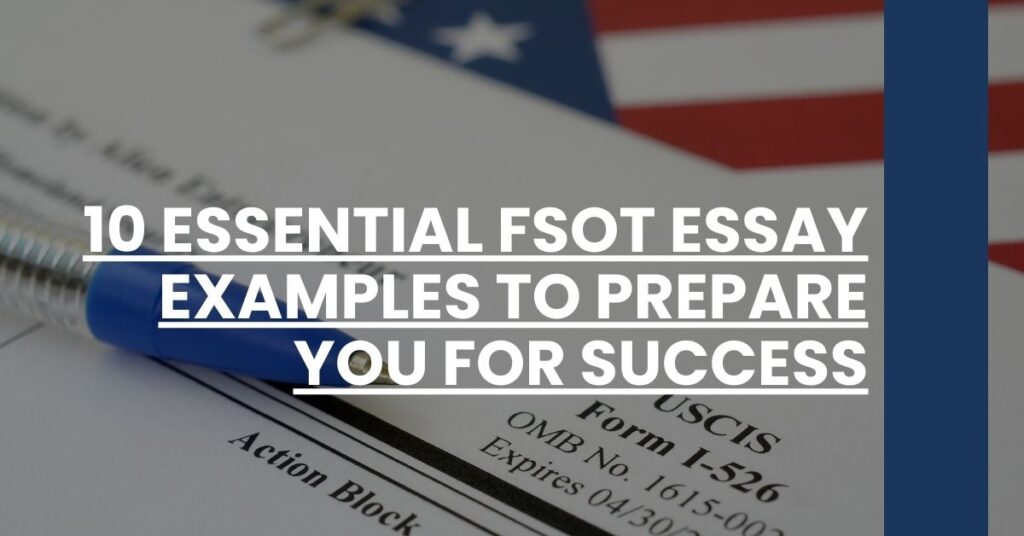Are you eyeing a career in diplomacy and feel daunted by the FSOT essay section?
Securing a top score on the FSOT doesn’t just require knowledge; it demands mastery in expressing it through powerful essays.
This article zeroes in on fsot essay examples that are less about theoretical advice and more about practical inspiration. Explore handpicked samples that will hone your writing to resonate with the exacting standards of the Foreign Service Officer Test.
- 1. Understanding the FSOT Essay Structure
- 2. Showcasing Diplomatic Problem-Solving
- 3. Crafting Persuasive Arguments
- 4. Integrating Global Affairs Knowledge
- 5. Demonstrating Cultural Sensitivity and Awareness
- 6. Exemplifying Clear and Concise Communication
- 7. Utilizing Effective Introduction and Conclusion Techniques
- 8. Applying Analytical and Critical Thinking
- 9. Exploring Compelling Personal Narratives
- 10. Emphasizing Strong Grammar and Syntax
- Improving Writing for the FSOT
- Reading and Analyzing High-Scoring Essays
- Conclusion: Elevating Your FSOT Preparation
1. Understanding the FSOT Essay Structure
To excel on the Foreign Service Officer Test (FSOT), you need to be well-versed in crafting structured, impactful essays. The FSOT essay is a pivotal part of the exam, assessing your ability to communicate effectively and persuasively. Let’s deconstruct the typical FSOT essay structure to set a solid foundation for your practice with fsot essay examples.
- Introduction: Begin with a hook that captures attention, followed by a clear thesis statement outlining your essay’s focus.
- Body Paragraphs: Develop a series of paragraphs, each one detailing a single point that supports your thesis. Ensure that each point is substantiated with evidence and analysis.
- Conclusion: Tie together your arguments, reinforcing your thesis and providing a strong closing statement.
When approaching FSOT essay examples, look for essays that demonstrate this structural clarity. Each section should flow logically to the next, making your argument easy to follow and understand. Transition words and phrases will be your allies here, guiding the reader through your points seamlessly.
2. Showcasing Diplomatic Problem-Solving
A key aspect of working in the diplomatic field is solving complex issues with finesse and strategy. To showcase diplomatic problem-solving in your FSOT essays:
- Identify a Diplomatic Scenario: Start by outlining a situation where diplomatic skills are crucial—whether it’s a conflict resolution or a negotiation.
- Illustrate the Solution Process: Describe the steps taken to resolve the issue, emphasizing negotiation tactics and conflict de-escalation techniques.
- Reflect on Outcomes: Consider the effectiveness and repercussions of the diplomatic actions you’ve described.
These elements, when articulated effectively in fsot essay examples, demonstrate not just your knowledge of international relations but also your potential as a diplomatic actor capable of nuanced thinking and calculated decision-making.
3. Crafting Persuasive Arguments
Persuasion is the art of influencing others, and in the context of the FSOT, it means constructing arguments that sway your readers. As you review fsot essay examples, pay close attention to essays that:
- Present a Clear Stance: State your position unequivocally. Others may hold differing views, but your task is to argue your point convincingly.
- Support Claims with Evidence: Every assertion you make should be backed up by facts, statistics, or authoritative quotes. Logic and reasoning should hold your arguments together.
- Address Counterarguments: Show you’ve considered other perspectives by acknowledging and skillfully rebutting counterarguments. This reflects a mature, critical understanding of complex issues.
Your persuasive skills are crucial in drafting an essay that is not only informative but also compelling and thought-provoking.
4. Integrating Global Affairs Knowledge
To thrive as a Foreign Service Officer, it’s imperative to be well-informed on global affairs. Your FSOT essay should reflect a keen understanding of world events and international politics. For example:
- Reference Current Events: Discussion of recent geopolitical developments shows that you’re up to date and engaged with the world.
- Incorporate Historical Context: Provide background information to give depth to your analysis, demonstrating your ability to connect past and present.
- Apply International Relations Theories: Use frameworks from international relations to inform your argument, showing that you can think in both abstract and practical terms.
Strategically incorporating these elements into your fsot essay examples signals that you’re prepared to engage critically with the forces shaping our world.
5. Demonstrating Cultural Sensitivity and Awareness
In diplomacy, cultural sensitivity and awareness are non-negotiable. You must be able to navigate the nuanced waters of international customs and norms with respect and understanding. As a pivotal figure in cross-cultural collaboration, your written work should exude this quality. Incorporate fsot essay examples that:
- Reflect Understanding of Cultural Norms: Show an appreciation of different customs and practices, and how they impact diplomatic relations.
- Promote Mutual Respect: Advocate for ways to foster respect between diverse groups, which is fundamental in preventing cultural misunderstandings.
- Highlight Global Citizenship: Embrace and advocate for values that encourage global community building and cultural exchange.
In essays, your ability to articulate these principles can be a testament to your readiness for the diverse challenges of a Foreign Service career.
6. Exemplifying Clear and Concise Communication
Clarity and brevity are your best friends when crafting essays for the FSOT. Your writing should be straightforward and to the point, eschewing any obscurities that could leave room for misinterpretation. Here’s how to achieve that:
- Use Active Voice: Active voice produces stronger, more direct sentences. For instance, instead of saying “The treaty was signed by the nations,” say “The nations signed the treaty.”
- Eliminate Redundancy: Be vigilant against repeating the same information. Each sentence should introduce a new idea or build upon the previous one.
- Avoid Jargon: While specialized terms are sometimes necessary, don’t overuse them. Ensure that your language remains accessible to any reader, not just those familiar with diplomatic parlance.
Fsot essay examples that exhibit clean, concise communication are your benchmarks. They showcase the efficiency and precision that you, too, should aim for in your writing.
7. Utilizing Effective Introduction and Conclusion Techniques
Crafting an engaging introduction and a strong conclusion is crucial for leaving a lasting impression on FSOT graders. Think of your introduction as a handshake—it sets the tone for the entire essay. And your conclusion? It’s your parting thought, the powerful echo you leave in the reader’s mind.
- Employ a Hook: Begin with a compelling quote, question, or fact that immediately draws the reader in.
- Thesis Statement: Clearly state your main point. This roadmap guides your reader through your essay.
- Concluding with Strength: Restate your thesis in the conclusion and summarize your main points, but don’t just repeat what you’ve already said. End with a forward-looking statement or a call to action that extends the implications of your essay.
Effective introductions and conclusions are like bookends, and superb fsot essay examples will display this symmetry, framing the content compellingly and cohesively.
8. Applying Analytical and Critical Thinking
As an aspiring Foreign Service Officer, your capacity for analytical and critical thinking is paramount. Your essays should be more than just a report on an issue—they should dissect, analyze, and evaluate it. Excellent fsot essay examples feature:
- Issue Breakdown: Divide the topic into manageable parts for deeper analysis.
- Evidence Evaluation: Weigh the evidence—its reliability, relevance, and implications.
- Original Insights: Offer fresh perspectives or solutions based on your analysis.
An essay that demonstrates these skills suggests a mind that can grapple with the complexities of international relations and deliver pragmatic solutions.
9. Exploring Compelling Personal Narratives
Personal narratives can elevate your FSOT essay from good to memorable. They add a human touch to your argument, making it more relatable and persuasive. Here’s how to integrate them effectively.
- Share Relevant Experiences: If you have personal or professional experiences that are pertinent, weave them into your essay to support your thesis.
- Reflect Personal Growth: Discuss what these experiences taught you and how they’ve shaped your understanding of diplomacy.
- Connect Globally: Tie your personal narrative back to larger global issues, demonstrating your broader awareness.
When studying fsot essay examples, observe how personal anecdotes lend authenticity to the essay and try to emulate that strategic emotional appeal.
10. Emphasizing Strong Grammar and Syntax
Nothing undermines an argument like poor grammar and syntax. They disrupt the reader’s flow and can obscure your message. Ensure that your FSOT essays are grammatically impeccable and syntactically fluid by:
- Conducting Thorough Edits: Review your essay multiple times, checking for grammatical precision.
- Reading Aloud: Hearing your essay can highlight errors and awkward constructions that you might miss when reading silently.
- Utilizing Writing Tools: Online resources like Grammarly can help catch mistakes and improve your writing.
When you peruse fsot essay examples, choose those that exemplify linguistic excellence—they are your templates for a polished and professional submission.
Improving Writing for the FSOT
Let’s focus on steps to enhance your essay writing skills, ensuring that when the FSOT arrives, you’ll be more than ready. These steps are a blend of art and science:
- Practice Regularly: Writing is a skill honed over time. The more you practice, the better you get.
- Read Widely: Absorb a variety of materials, from international relations journals to op-eds to enhance your understanding and vocabulary.
- Seek Feedback: Constructive criticism is invaluable. Don’t hesitate to have mentors or peers review your work.
Remember, your written communication is a direct reflection of your diplomatic potential, so invest the time and effort to refine it.
Reading and Analyzing High-Scoring Essays
The critical evaluation of high-scoring FSOT essays paves the way for your success. Examine these essays to learn what makes them effective:
- Identify the Techniques Used: Determine what rhetorical strategies and structures the author employed.
- Assess the Argumentation: Look at how arguments are presented and supported.
- Evaluate the Style: Note the tone, diction, and rhythm of the writing.
By dissecting these fsot essay examples, you not only gain insight into what graders are looking for, but you also develop a keener eye for your writing improvements.
Conclusion: Elevating Your FSOT Preparation
In navigating the vast sea of FSOT preparation resources, remember that quality trumps quantity every time. Focus on fsot essay examples that resonate with finesse, clarity, and intellectual rigor. They are your blueprints to constructing essays that will not only pass the FSOT but will also lay a strong foundation for your future career in the foreign service.
Consistent practice, insightful analysis of high-caliber essays, and a dedication to self-improvement will undeniably ascend your FSOT essay writing capabilities. Trust in your potential, and with each word you pen, step boldly toward the distinguished path of a Foreign Service Officer.
Explore FSOT essay examples to master the test structure, hone diplomatic writing, and enhance global affairs knowledge effectively.

